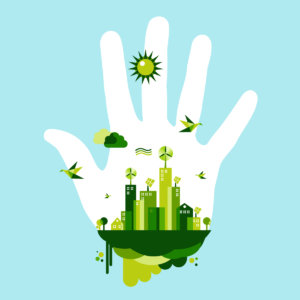Welcome to my blog! For the first week of this blog, I would like to say that this whole blogging thing is new to me and I will hopefully be improving over the next couple of weeks as I get used to the guidelines and how this whole concept works. Over the first week, we have been reading Sustainability Principles and Practice, by Margaret Robertson. We've have been tasked with giving our input on three quotes from the first two chapters of the book. I found the reading to be very intriguing and informative, to say the least. Learning about a wide variety of concepts and sustainability terms that I was not so familiar with has been an eye-opening experience. Further ahead in the blog I will be highlighting three quotes that resonated with me from the assigned reading.
The first quote I will be highlighting is "Today we live on the threshold of what has been called the “fifth great turning” (Heinberg 2011, 284), a turn away from a fossil fuel-powered, climate-destabilizing, growth-based industrial economy and toward a sustainable, regenerative society" (Robertson, 2007). I found this quote interesting because I have never heard of the term Anthropocene be used before to describe a new era where humans are the driving factor. Before now, I had always assumed that most of these eras had specific things tied to them usually being related to some geological matter. To now know that we as a species is influencing the planet on a global scale enough to have an era dedicated to us really just shook my mind on the impact we all have.
The second quote I will highlight is "In Life in the Woods, he wrote: “What we call wildness is a civilization other than our own” (Robertson, 2007). To think that even in the 19th-century people had this level of insight is truly surprising. During this time the industrial revolution was slowly beginning to make its way into the world and I'm very glad Thoreau was one of the pioneers of conservational thinking with a quote as insightful as this. Realizing that the planet is made up of many interconnected systems, and taking care of those systems, is crucial to effective conservation.
Finally, on page 14 the author mentions something that is a stark contrast from what we see today, "Energy conservation was promoted by the Energy Policy and Conservation Act of 1975. Two years later the US Department of Energy was created." (Robertson, 2007). The fact that legislation in the 1970's was passed so quickly and then an entire departmental agency was created boggles my mind. It's crazy to think about how 44 years ago the government seemed more passionate and thoughtful about the environment. In a current age where many of these regulations are being rolled back, it's interesting to note that even so long ago priorities were different. Given that we have a more profound understanding of our effects on the planet, I think a lot needs to change before we start enacting more beneficial legislature in the future before it's too late.
Images from:
https://sloanreview.mit.edu/article/defining-true-sustainability/
https://news.artnet.com/art-world/laser-technology-ancient-mayan-1214558


No comments:
Post a Comment